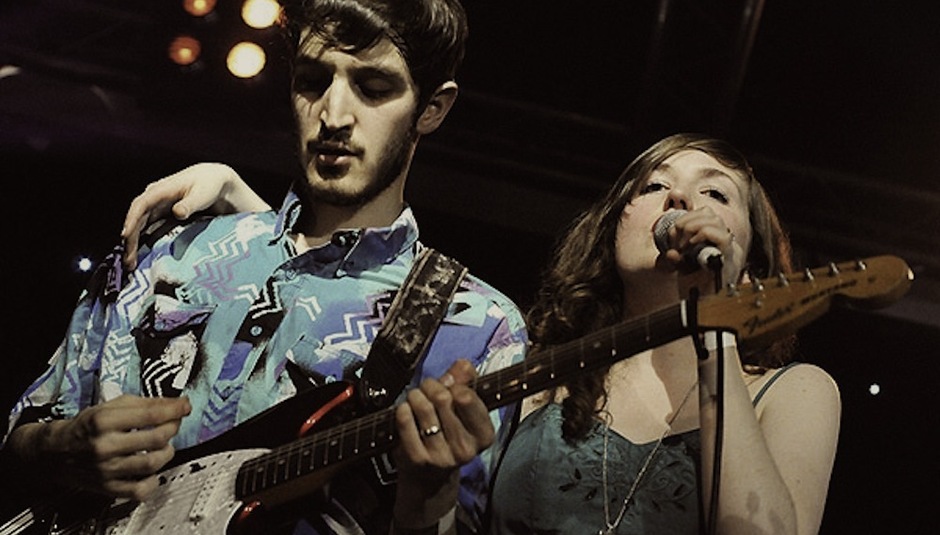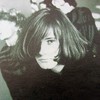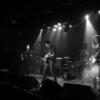'Planet Gear' is an irregular feature in which we ask musicians to get a bit geeky and talk us through the equipment that makes the 'magic' happen... Here, Jeremy Warmsley of Summer Camp talks us through the making of their new album.
I think it's such a cliché to insist on only working with beat-up old gear, all crackly synths and broken guitar pedals. I equally think it's very unwise to only use plug-ins and clean digital sounds. My philosophy is that anything can sound good in the right context, whether it's a crusty sample or a vocal recorded through a £10,000 mike and a one-of-a-kind preamp.
That said, I definitely form attachments to certain bits and bobs of gear and I'll go through some of them here. I've gone into quite a lot of tedious, geeky detail about what I like about these instruments but if you've got this far that's hopefully what you're after!
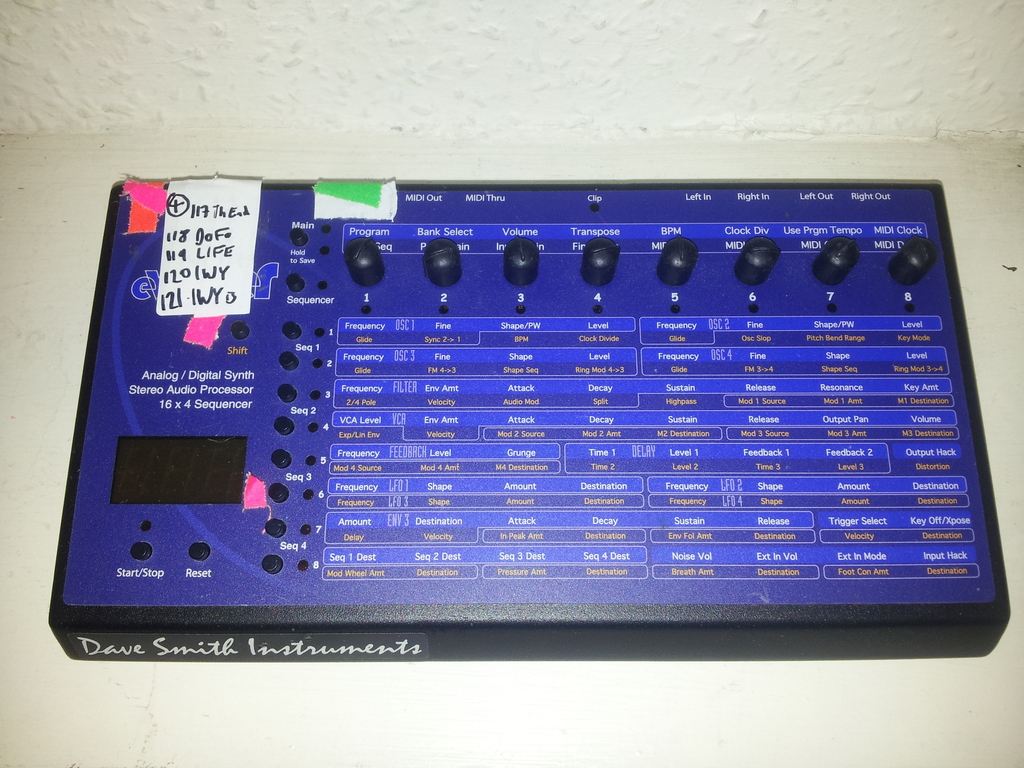
This my Dave Smith Instruments Evolver module. Dave Smith created one of the most celebrated early polysynths with the Prophet 5, and went on to invent MIDI (for which he won a Grammy earlier this year) and the world's first softsynth (that is to say, a synthesizer created only in software with no hardware control whatsoever). In the early 2000s he returned to “proper” (ha!) hardware synthesis with the Evolver, a synth that basically does everything; analog and digital oscillators, routed through an analog filter and then into a digital distortion & delay.. It's incredible at character – not too hot on subtlety, but you can get a bewildering range of sounds out of it. My unit is monophonic but it's just marvellous. All the synth bass on “I Got You” is from the Evolver, and actually the string sample was run through the filter as well. (You can run external signals through the Evolver which is great, if sometimes a little chaotic).
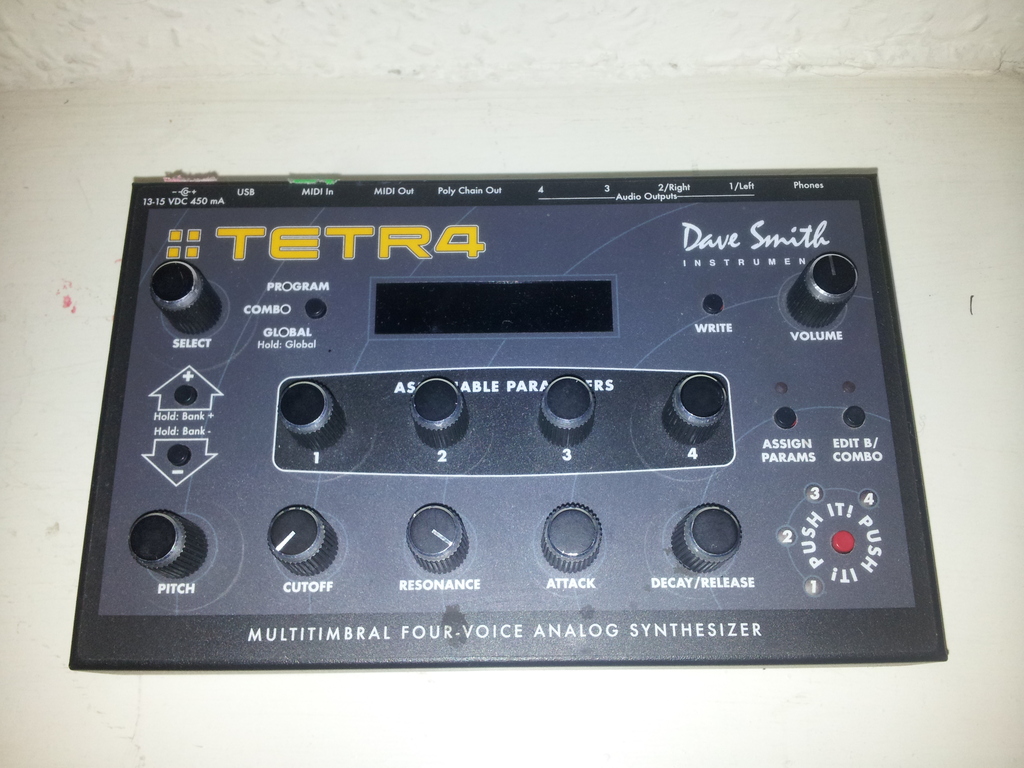
He went on to create a new version of the Prophet, the Prophet 08, much beloved by James Blake and Thom Yorke. The Tetra is just a 4-voice, stripped-down version of the Prophet and it is gorgeous. You can use it for anything from icy digital strings to super-warm Blade Runner pads to strange clicky arpeggios. Most of the synth patches on the record are Tetra. For a band like us, forced by circumstance to work in the digital realm but always questing after a warm, analog feel, it's perfect: you can figure out exactly what you want to play in MIDI and then feed the notes into these little wonder-machines, fiddling about with the parameters to your heart's content. On 'Two Chords', the motorik keyboard rhythm that runs through out the track is the Tetra: I used a sequencer setting to spit out chords at the tempo of the track, gradually speeding it up through each chord change before snapping it back into place at the first beat of the next bar. The warm synths at the start of 'Pink Summer' are a more straightforward use of the synth. (These synths are both useless without a MIDI controller, of course).
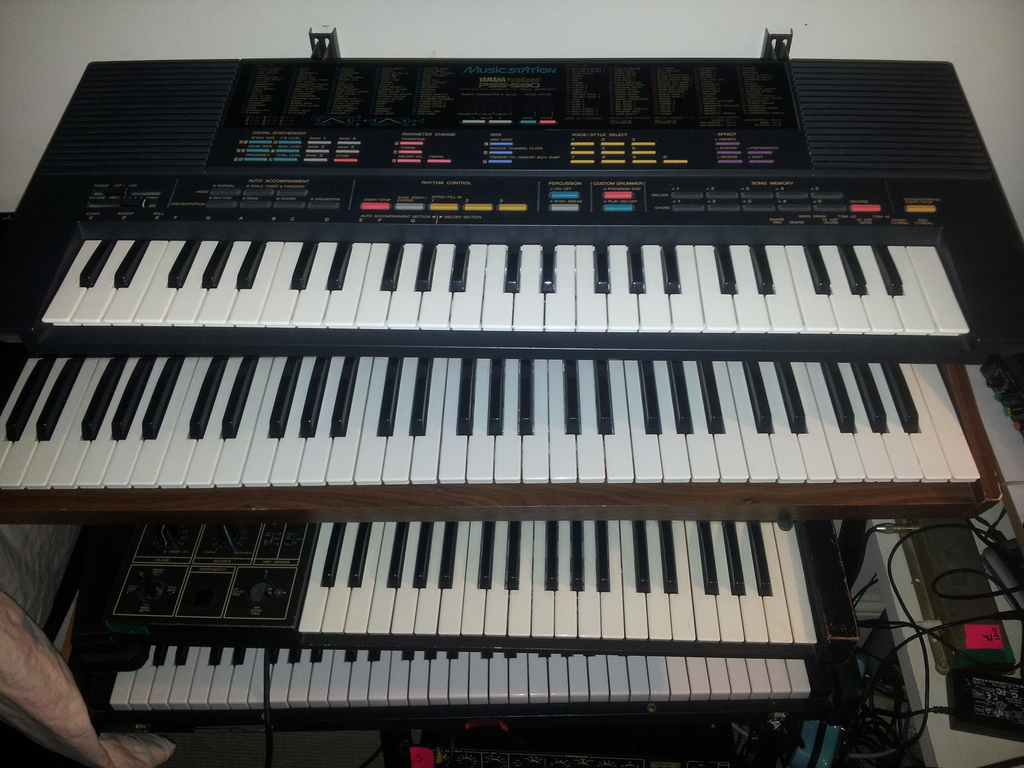
The top keyboard in this pile of delights is the Yamaha PSS-580. It looks like a toy (it is a toy, really) but it's actually incredibly powerful. There are several methods of synthesis: the most well-known is additive synthesis, which is what the Tetra & Evolver do. You get an oscillator to spit out a signal, then you muck around with it, filtering off bits, distorting it, changing its dynamic envelope (that's what she said), whatever. On the other, tediously complicated hand, FM (frequency modulation) synthesis reduces synthesis to an extremely complicated maths problem, multiplying sine waves together, rather than adding them, to create preposterously complicated timbres. Perhaps you're familiar with the Yamaha DX-7, essentially a giant calculator which uses SEVEN “operators” to create its famous yet hideously cheesy pianos & bells.
The PSS-580 is built on the same principles but is mercifully simple by comparison: just two sine waves, multiplied together at different frequencies, and all joyously editable in a charming, Fisher-Price way. All the presets sound great and best yet, the digital engine only works at 12 bits, which means that as sounds fade away you, the reverb audibly crackles into nothingness. Everything has this deliciously warm sheen – about as far from the cheesy 80s brightness of the DX7 as it's possible to get. Elizabeth is crazy about this synth... It was all over Ghost Train and the rest of our first EP, but hasn't seen so much use since then. But we used it for the cute background synths on Fresh and the epic calypso melody on Two Chords. (Also in shot is our incredibly hi-fi spring reverb, ripped out of the back of a broken amp).
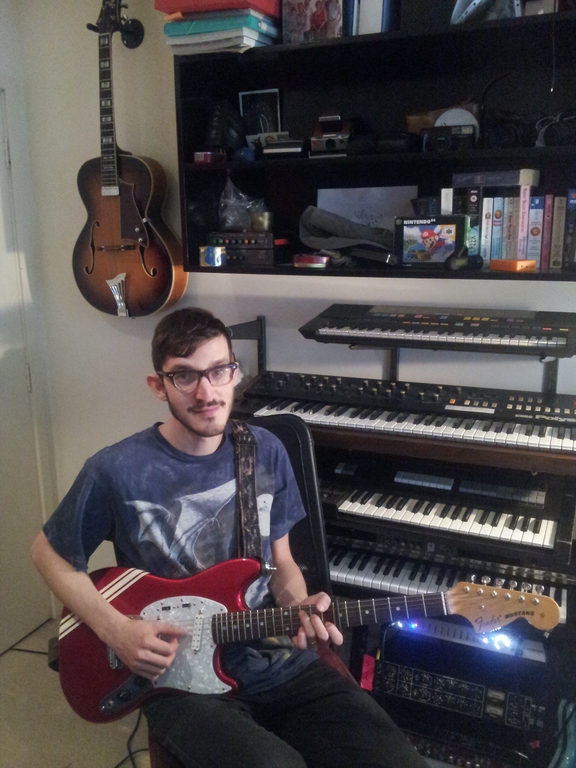
I've had this guitar, a Fender Mustang, since I was 19. I used it in my early years as a solo artist before forming Summer Camp; I'm not sure why as it's uniquely unsuitable for the sort of music I was playing then. I was crazy about Talking Heads, XTC and Wire when I bought it and I wanted something that would let me play really bright, crackly, funky rhythms. The Mustang was the brightest guitar in the shop – I've always found Tele's twangy rather than bright. Anyway as I “grew” and “developed” as an “artist” (gross) my fondness for bright, trebly sounds faded (along with my hearing, probably) and I developed a taste for warm, deep sounds. I was lucky enough to be given a guitar (pictured hanging up at the back there) by the lovely people at Peerless. (Being given gear is not something that happens a lot even as a professional musician, so when it does, you appreciate it a great deal!)
The Peerless Port Town, a beautiful archtop guitar with an incredibly loud humbucker pickup, was perfect for the indie-folk genre I was working in at the time (it pains me to collapse four years of my life down to those three words, but there you go). When we started Summer Camp, though, it was back to the Mustang: the slightly shonky sound it had developed over the years of not being looked after properly was perfect for our early, naïve songs. Best of all though, was the tremolo unit on the bridge. I removed the whammy bar and found I could get much subtler pitch-modifying effects by waggling the bridge with the palm of my hand. Most Mustang players lock the tremolo down so as to avoid this; I've found it to be an integral part of my playing style. Now, the trouble is that once again, as we've “matured” (vom!) as a band, our tastes have leant away from the scrappy and towards the warm & deep. But I can't abandon the Mustang, as the tremolo method simply doesn't work on any other guitars. (Woah... first-world problems, much?) My interim solution has been to rip the pickups out and put some beefy humbuckers on there, and go for pedals & amps that enhance the lower-midrange and avoid the honk, but really my dream guitar would be something like a Les Paul with a Mustang whammy unit. An impossible dream, apparently, due to the curved body of a Les Paul. I used the Peerless to double-track a couple of things but most of the guitars on the new record is the Mustang. (The Peerless plays the uber-distorted riff on “Down” from our first record).
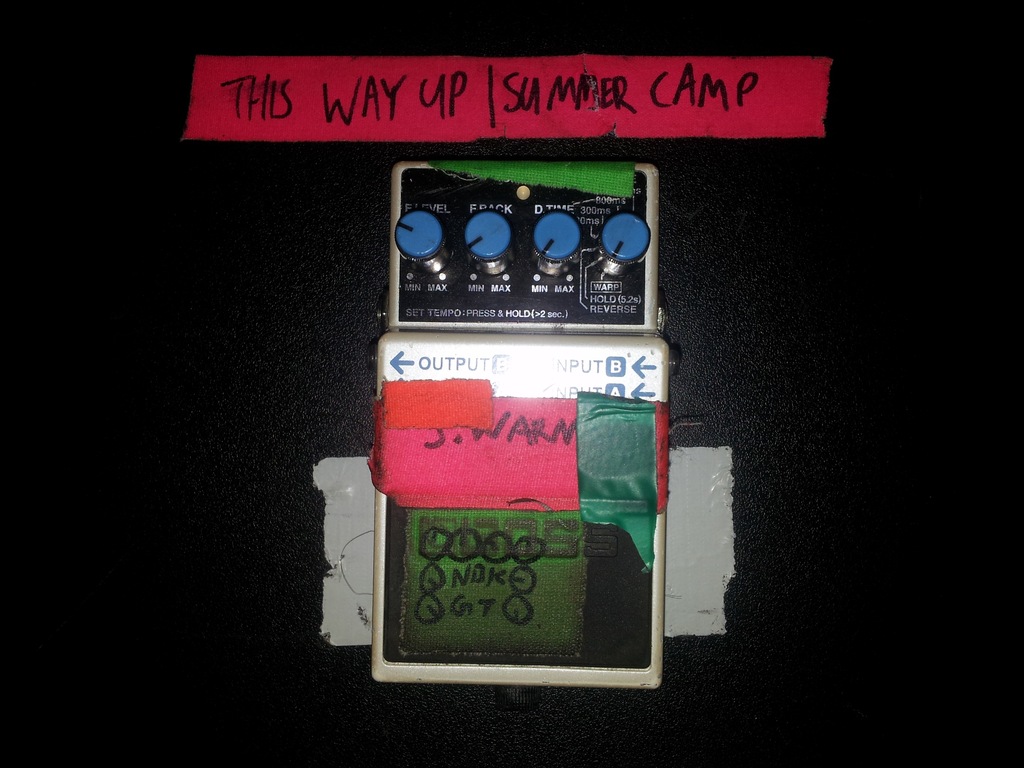
This is not a particularly legendary pedal; it's not rare or hard to find or even very expensive. It's known for being a workhorse pedal, a bog-standard digital delay with a few frills. On our last tour I found there were a couple of keyboard bits that were impractical to do on keyboards live, as I was already on guitar and couldn't switch over fast enough. I found a way of using this pedal, the Boss DD-6, to create infinite drones by fading up chords into the pedal, set to “Warp” mode. This creates an infinite loop of whatever it receives as long as the pedal is held down; as soon as it's released, the drone fades out. (It's an effect you can get with various different delay pedals; I first experimented with it on a song on my first solo album – those background drones in the verses, if you can pick them out from between the synth overkill). As soon as I discovered this, I set to work putting it on pretty much every song we wrote for the new album. The guitar solos on The End, Keep Falling and Two Chords, for instance (it's great for making long notes blur into one another) or the pads in the bridge of Crazy and the intro of Night Drive. With a bit of Mustang-tremolo waggle, it creates these beautiful chorusy, phasey soundscapes that I very much enjoy. The intro of Two Chords, of which I'm irrationally proud, is another setting on the DD6, the Hold setting - a simple looper, but abused & used incorrectly. I'm a big fan of not using things the way they're “supposed” to be. (PUNK ROCK, man). I actually wrote this bit in my head before trying it out and for once it sounded exactly as I imagined it.

I include our bass, the Itlalia Mondial, mostly for the visual LOLs – as you can see, it's made of plastic and is a delightful shade of turqoise – but we have used it on 90% of our songs. Anything with bass guitar, this is it. It is a great sounding bass though – a bit like a Rickenbacker, plunky and thick, especially now I've put flatwound strings on. I always palm-mute the bass, for that Wrecking Crew/Motown sound. Also in shot, my Seagull acoustic guitar, yet to make an appearance on a Summer Camp record, but great for plonking around on. I lost this on a train and it turned up six months later – someone's dad found it and they found me on Facebook to return it, which was nice!
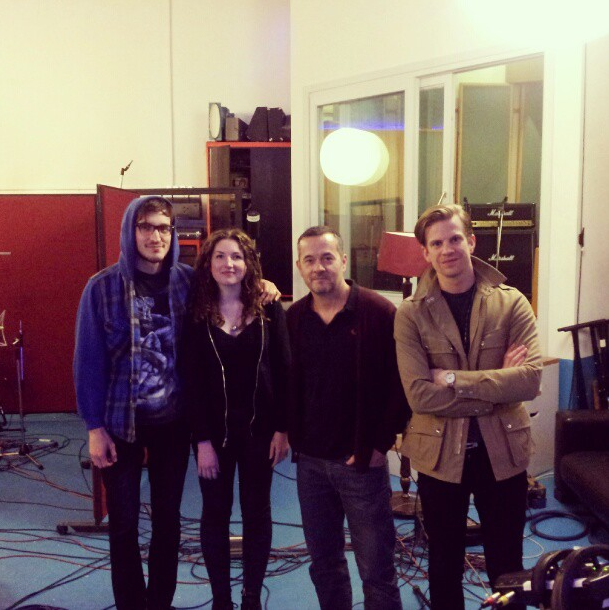
The one thing that had the greatest impact on the sound of our record wasn't a piece of gear, it was a person. Stephen Street (pictured here with us and our drummer William Bowerman of Brontide, who drummed on “Night Drive”, “The End”, “Two Chords” and “Everything Has Changed”) who is best-known for his work on records by The Smiths and Blur, co-produced and mixed the record (bar Pink Summer, which we did ourselves). Working with Stephen showed me that it really isn't about the gear, it's about what you do with it. Another cliché, but really very true. Certainly Stephen has great gear – a beautiful Audient desk, LA2A compressor, Neumann condenser mike, API EQs and a Thermionic Culture Vulture (the secret to getting bass to sound incredibly thick and warm). But even before he got any of that stuff involved, just the way he would balance the vocals against the drums against everything else displayed a mastery of technique; not just the skill and experience of knowing what to do, but pure talent – just the pure, naked ability of being able to make sounds better just by balancing them.
He has the best ears of anyone I've ever worked with, for sure. He also has no ego and is always up for trying ideas (there's nothing as frustrating as being in the studio, imagining the perfect overdub and being denied the opportunity to even try it out). Also, if something's working, he lets it be. We spent a lot of time on our demos, and by and large we were happy with the arrangements when we brought them in to Stephen. Unlike so many engineers and producers, he actually listened through to ever single element before deciding whether or not to replace it; when he did change something, it was always for the better. We even kept the demo vocals on most of the tracks.
You'll find lots more Planet Gear columns here.
Summer Camp's new single 'Two Chords' is out on Nov 18th.
Summer Camp play the following European dates:
17 Nov - Cambridge, The Portland Arms
18 Nov - Manchester, Deaf Institute
19 Nov - Newcastle, Think Tank
20 Nov - Glasgow, Broadcast
22 Nov - Leeds, Belgrave Music Hall
23 Nov - Bristol, Exchange
24 Nov - Birmingham, Hare and Hounds
25 Nov - Brighton, The Haunt
27 Nov - London, Heaven
29 Nov - Paris, Point Ephemere
30 Nov - Reims, Elektricity Festival
01 Dec - Brussels, Botanique Rotonde
03 Dec - Amsterdam, Paradiso
04 Dec - Cologne, Studio 672
05 Dec - Hamburg, Prinzenbar
06 Dec - Copenhagen, Beta
07 Dec - Stockholm, Debaser
09 Dec - Oslo, Revolver
11 Dec - Berlin, Comet Club
12 Dec - Munich, Atomic Café
13 Dec - Zurich, Exil
14 Dec - Ravenna, Bronson

